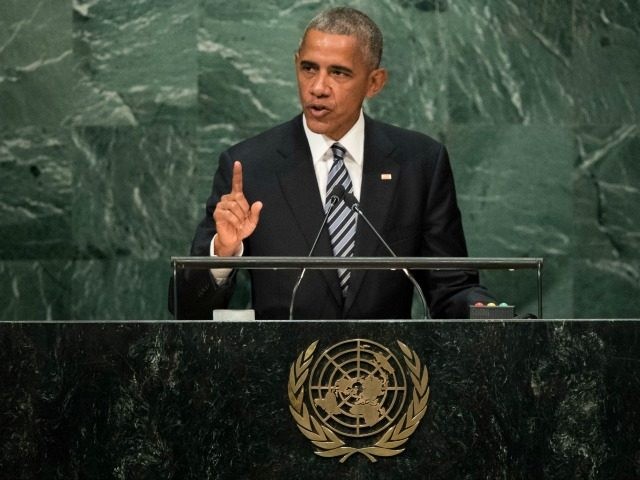In his speech to the United Nations, President Barack Obama defended the increased globalization of the world’s nations, condemning the wave of populist nationalism that was growing in the world in response.
Obama says globalization will continue growing rapidly, signaling the unstoppable march of progress. But he warned that nations who allow the wealthy to enjoy the benefits of globalism face challenges from their populace. Those people, he noted, were falling prey to an “alternative” narrative, propagated to fuel opposition.
“Alternative visions of the world have pressed forward, both in the wealthiest countries and in the poorest,” he said. “Religious fundamentalism. The politics of ethnicity or tribe or sect. Aggressive nationalism. A crude populism. Sometimes from the far left but more often from the far right.”
He referred to a “collision of cultures” that was challenging each country and called for world citizens to reject religious fundamentalism and racism.
“That’s a truism. That global integration has led to a clash of cultures. Trade, migration, the internet, all these things can challenge and unsettle our most cherished identities,” he said, alluding to France’s burkini laws and Muslim clashes with France’s offensive cartoons.
He also urged each country to evolve towards progress, describing the conflicts as part of the old world.
“The world is too small. We are too packed together for us to be able to resort to those old ways of thinking,” he said.
Obama alluded to Donald Trump’s campaign promise to build a wall on the Southern border three times, pointing out that such an action would be futile to stop many of the threats facing the world.
“Today, a nation ringed by walls would only imprison itself,” he said.
“The world is too small for us to simply be able to build a wall and prevent it from affecting our own societies,” he said afterwards.
“Mosquitoes don’t respect walls,” he added later referring to the Zika virus.
Obama drew laughter from the audience of world leaders after he pointed out that American allies and adversaries believed that all the world’s problems were either caused by Washington or could be fixed by Washington.
“Perhaps too many in Washington believe that as well,” he joked.
He concluded with an examination of fallen human nature, pointing to the challenges that humanity faced.
“Time and again human beings have believed they finally arrived at a period of enlightenment only to repeat cycles of conflict and suffering,” he said. “Perhaps that’s our fate.”
But he explained that young educated people gave him hope and optimism about the future, as they could shed old social and cultural norms to fight for progress.
He cited his own multi-racial and multicultural background as proof that the world could improve.
“My own family is made up of the flesh and blood and traditions and cultures and face from a lot of different parts of the world, just as America’s been built by immigrants from every shore,” he said.
Rather than oppose immigrants and refugees, Obama said, it was important for leaders to help everybody in the world with their problems.
“This is what I believe that all of us can be co-workers with God, and our leadership and our governments and this United Nations should reflect this irreducible truth,” he said.

COMMENTS
Please let us know if you're having issues with commenting.